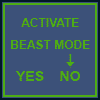|
Evil Mastermind posted:To go back to the idea that "larger game = bad game", I have to disagree with that; I'd honestly rather have a larger game that tells me how it's supposed to work over a smaller game that doesn't tell me anything past "here's the system, we're not going to expand on anything, good luck". I really agree with this. I like systems that give me all the rules, and the rules to create more rules. I'm including all of the rules I used to create skills in my skill chapter, so you can (hopefully) determine what a new skill would look like, what it would do, how much it would cost, and what its benefits are for your character. Give me all of the rules I need to play any sort of character the system supports. If that takes 60 pages or 600 pages, I'll buy it if it's got a good layout and makes sense mechanically.
|
|
|
|

|
| # ? Apr 29, 2024 09:46 |
|
As far as actual books go I don't see much of a solution to the accessibility dilemma beyond getting an editor who is a miracle worker and can trim down those 400-800 pages down to 200 without it turning out like The Secret Fire. Splitting off the books into two or three isn't a bad idea by itself, the problem is when the extra books are obligatory purchases and not actually optional (I'm looking at you, DMG and MM) because that doesn't really fix much. Dresden manages this somewhat reasonably, you don't really need the supplemental book if you're going with your own setting and don't want to use the existing one as inspiration. I think we could stand to do away with hardcovers and possibly pdfs, which would go a long way towards making things easier to distribute, more easily affordable, and hopefully tone down the noise to signal ratio. It might be a technical manual, but it should read like a game, damnit.
|
|
|
|
angry_keebler posted:Give me all of the rules I need to play any sort of character the system supports. If that takes 60 pages or 600 pages, I'll buy it if it's got a good layout and makes sense mechanically. The trend nowadays for games to explain how they work "under the hood" and how to adapt them to your wants and needs is a great thing, and I hope more designers pick up on it. Just in the sense of three of my current "go-to" systems: Fate (especially Dresden/LoA) spends a lot of time explaining how to model stuff in the Fate Fractal, and give a good amount of advice on how to design your own stunts/powers. There's not a lot of post-initial-book expansions, but both games give you enough information to make your own classes/creatures/whatever and keep them mechanically balanced. In either case, you can get away with the core books. Savage Worlds doesn't tell you how to make new powers from scratch, but it presents powers in such a way that you can figure out how to take the list of generic powers and reskin them to what you want. You can run most genres out of the core digest-sized book; the only two I don't think you can easily model are supers and cyberpunk (both of which require a bit more mechanical support), and you can grab the Super Powers Companion and Interface Zero for those. Still, you're looking at one $10 digest-sized core book that covers most genres with a little player-handled re-skinning. Apocalypse World and its "Powered by the Apocalypse" spin-offs have a very light mechanical core, and each game has a chapter about how the system works, and then explaining how to make new moves for your characters and games. But then you look at something like D&D/Pathfinder, and there's nothing about real customization. How do I make a new feat/class/spell/power that's mechanically balanced? You got me. I have to wait for more and more supplements (with the attendant bloat) and hope I get something I can use. (The other trend I'm really liking is the digest sized core book, but that's because I can carry a bunch of different games in my game bag easily.)
|
|
|
|
angry_keebler posted:Int Stat stuff In one of the games I'm working on there is no general Int stat, because intelligence is represented by a character's proficiency with a given skill. I do have Perception, Willpower, Charisma and Magic as mental statistics, though, and my system's intended for a Dawn of Civilization/Dying Earth mashup, so setting's also important for determining abilities. I removed Int because it didn't have any good uses based on how my mechanics were coming together. By the way, I was thinking about a quote that apparently was from Sid Meier on why traditional RPGs suck: Sid Meier posted:Further, games require not just meaningful choices but also meaningful communication to feel right. Giving players decisions that have consequence but which they cannot understand is no fun. Role-playing games commonly fail at making this connection, such as when players are required to choose classes or skills when “rolling” a character before experiencing even a few seconds of genuine gameplay. How are players supposed to decide between being a Barbarian, a Fighter, or a Paladin before understanding how combat actually works and how each attribute performs in practice? Choice is only interesting when it is both impactful and informed. This quote made me go back and look over all the stuff I did for my game, and I didn't like what I was seeing. My idea of skill paths was making the game less and less accessible, and it required players to look over all the options at the game's beginning. So, I decided to do two things: "Beginner/Quick Play Options:" the only really major learning-curve/system trap stuff in my mechanics is how skills work: you choose one, maybe two paths within a skill and as you level up, you choose more abilities related to that skill. Well, maybe you don't feel comfortable going through all the options, but still want to play. Or maybe you're focusing entirely on social kung-fu, and you couldn't give a drat about how your character does magic. So, each skill (in my game) would have a Quick Play path that gives some generic, yet useful abilities that are just as useful as the other options, but only have one thing a level: more of a skill ladder than tree. And if a beginning player wants to branch and try out more complex character advancement, or if a more experienced player wants to take some of the "Quick Play" abilities along with some other stuff, the rules would support that. "Character Creation Through Playing:" this is partially inspired by that great player's manual in the 4E Red Box. Characters run by beginners start off with the blandest stats imaginable: in my game's case, 3/d6's in all abilities, 1/d2's in all skills. As the game goes on (this only works with the help of the other players and the Ref) the player assigns/adjusts the rest of her ability points, determines their primary/secondary skill (with the beginner paths from above), their class, and then finally backgrounds by the end of the session. Has anyone done anything similar? Also, I apologize if me continually referencing my system is really annoying.
|
|
|
|
TK-31 posted:As far as actual books go I don't see much of a solution to the accessibility dilemma beyond getting an editor who is a miracle worker and can trim down those 400-800 pages down to 200 without it turning out like The Secret Fire.  THE SECRET FIRE's problem was that it was orignally intended by the writers to be in the 200 page range; then they wrote 400 pages. But when it came time to chop stuff out to get it to 300 pages, they didn't cut a monster or two, or a spell or two, or any of George Strayton's prose or self-fellating. Instead, they cut out a few subsystems. But even then, they either didn't remove the references to the removed content (the Elder Gods rules), or just left stuff half-finished (the stuff for designing cities like characters). What pissed me off about this was how they released the Wrath of the Elder Gods table, it was small enough that they could have removed one drat spell and it would have fit in the game! Lesson to take from this: Learn to prioritize. Mechanical sub-systems that're used by every character are ultimately more important to a game than another drat spell. quote:Splitting off the books into two or three isn't a bad idea by itself, the problem is when the extra books are obligatory purchases and not actually optional (I'm looking at you, DMG and MM) because that doesn't really fix much. Dresden manages this somewhat reasonably, you don't really need the supplemental book if you're going with your own setting and don't want to use the existing one as inspiration.
|
|
|
|
Mikan posted:There's nothing wrong with the concept of Ability Scores, it's how they're used in 4e (and D&D, but let's focus on 4e.) You can skip another step ! I've run more D6 than anything else and part of that is for how clean the abstraction is. D6 does have Ability Scores but instead of an abstract number like D&D or the -4/+4 modifier that you actually use, the score for each ability is the actual number of dice you actually roll when you test that ability. Skills work the same way. The number on the character sheet is what you actually roll. No charts, no tables, no modifiers, just roll what's on your sheet and roll high. That's probably as clean as it is possible to get and still assign numbers to things like that. The next step is FATE, in which if you want a significant physical trait you just take an Aspect. Everyone else is just assumed to be average if they don't have a relevant Aspect. This lets you keep the obvious benefits of having something to say "Really strong" on the character sheet while not having to put up with unnecessary levels of abstraction.
|
|
|
|
What's an example of a rule you found elegant and efficient? The card-based skill challenge system of Castle Falkenstein I have run one-shots of this game with new players a few times and each time it's taken no time to learn because once you've learnt and made the character sheets (10 minutes) and how to do a skill challenge (another 5 minutes) you're good to go. Castle Falkenstein uses a system of playing cards instead of dice. Each player has a hand of four cards at all times and when they are faced with a challenge they get to play cards to improve their chances. The trick is that each ability is assigned to a suit and only cards of that suit count their full value towards the challenge. So a player may have a base Charisma value of 4 and, noting that Charisma is This mechanic is seriously easy to learn and once it's learnt the game is pretty much ready to go. If the player wants to attempt a skill in opposition to another player (such as a fistfight) then both can use suitable skills and play cards. The GM has his own hand of cards that he can play from to help skill challenges for NPCs, or to increase the difficulty of a skill check if he thinks a failure might be more interesting than a success. Resolving the effects of the skill checks is also easy. If the player's total meets the target number then the attempt is a success (you pick the lock). If it beats the target number by half again then it's a "high success" and there is a small benefit (the lock is picked in record time and dead silence). If it beats the target number by double then it's a "full success" and there is a notable benefit (you learn the mechanism so well that you get a bonus to picking all future locks of this type). If the player's total is half or less of the target number then you can introduce a new problem in the manner of a critical failure. Further, the use of cards has beneficial side effects to the way that players approach the game. By having a hand of a limited size that is continually replenished, then there is no sense of saving abilities for when you "really need it". A player can choose to save their high-valued cards, but the limited size of the hand would reduce that player to having to cope with only 3 "card slots" (then 2 then 1) if they do, creating an interesting trade off between conserving resources and adaptability since that high-valued card is only useful for a subset of the skills. Additionally, as each skill has an ability, it encourages players to choose skills distributed between the four suits in order to make better use of the cards that may come up (instead of creating a one-dimensional character loaded up on physical In summary, I have found that the skill challenge system in Castle Falkenstein is:
But don't bother with the game's duelling mechanics because they are worthless. AgentF fucked around with this message at 10:22 on Jul 21, 2012 |
|
|
|
Evil Mastermind posted:To go back to the idea that "larger game = bad game", I have to disagree with that; I'd honestly rather have a larger game that tells me how it's supposed to work over a smaller game that doesn't tell me anything past "here's the system, we're not going to expand on anything, good luck". Besides what Gau said, those books do not need to be that big. There is not nearly enough interesting or usable content for me in either to justify smacking down 115 bucks for them, because that's what they cost in my country. The core system is so simple that it can fit on a pamphlet. Rather than realize that and embrace it, both games instead chose to balloon to a size that's frankly ridiculous. e: In fact, here. This is a tri-fold version of Fate. Why does a game that fits in that much space need 400+ pages? It doesn't, and yet there are multiple versions of it that take up that much space and the rules in each are certainly much bigger than a pamphlet. Rulebook Heavily fucked around with this message at 11:26 on Jul 21, 2012 |
|
|
|
Rulebook Heavily posted:Besides what Gau said, those books do not need to be that big. There is not nearly enough interesting or usable content for me in either to justify smacking down 115 bucks for them, because that's what they cost in my country. The core system is so simple that it can fit on a pamphlet. At the risk of turning this into an argument about everyone's preferred game size, "you can pare it down to five pages" can be said about most games out there. I've seen 4e broken down into a couple of pages, but again shorter isn't necessarily better. Yeah, I can run Fate off a three-page pamphlet, but that's because I know it well. In terms of length, here's how DF breaks down: "Player's section" Intro/Fate Basics: 22 pages City Creation: 25 pages Character Creation: 15 pages Types & Templates: 14 pages Advancement: 7 pages Aspects: 19 pages Skills: 25 pages Mortal Stunts: 3 pages (stunt descriptions are in the Skills chapter) Magic & powers Supernatural Powers: 30 pages Playing the Game: 18 pages Living with Magic: 22 pages Spellcasting: 55 pages GM's section Running the Game: 25 pages Building Scenarios: 16 pages Nevermore/Baltimore: 33 pages (sample setting) Glossary/Index/Reference: 14 pages Now, do all those sections need to be in this book? Maybe not. You don't need sections like Building Scenarios and the sample setting. But the reason why I defend the size and content of the book is because while the core of "here's how Fate works" only takes up about 50 pages (intro and skills chapter), the rest of the book is setting-specific stuff (monster powers, magic) and GM advice on how to play the game. You couldn't do that in a pamphlet. If I handed you Tr-fold fate and said "okay, run Dresden Files", could you do it? Likewise, if you had never seen Fate before and said "okay, run Fate", would you feel confident that you wouldn't mess anything up? DFRPG is 400 pages, yes, but it's not 400 pages of solid rules like everyone seems to imply whenever they complain about the size. There's a large amount of advice and examples in there too.
|
|
|
|
The point I'm making isn't about game size (well, not just), nor am I criticizing Dresden Files for having a setting. It's about condensing your design and simplifying it. Look at the Spirit of the Century SRD and compare it to trifold. Both are largely setting-free and rules-focused, but one would fill hundreds of pages in print even if you only use the rules that appear in both and leave out the rest. That's the kind of thing I'm talking about! A lot of the SotC SRD is just plain verbiage, things which could be rephrased to be simpler or clearer. The trend I'm talking about is about rules bloating up like that in unnecessary ways. But if that's a contentious point, I'll leave it off so the thread can talk about something more productive.
|
|
|
|
Rulebook Heavily posted:But if that's a contentious point, I'll leave it off so the thread can talk about something more productive. Yeah, I agree. We're getting away from "what's general good design" and "what's design that I personally like". Sorry, folks.
|
|
|
|
Alright, I've been working on "finalizing" a rough draft of sorts that I've had planned for my players this school year. My original goal was to make a fantasy fate game but a lot more concise, to the point, and specific to my needs of A) taking the things Dresden did for FATE, and B) adding some of my own ideas that the players wanted like 4e style powers, less aspects and fate points, etc. Anyway here is the rough draft, coming in at 39 pages. It's 5 chapters, and is the bulk of the player info. The only thing I would add is chapter 6, which goes into details on combat and a few more specific rules I didn't cover, which I think should be doable with examples in only another 10 pages. That leaves 50 more pages for GM info/advice/monsters/little bit of setting fluff. Let me know what you think about the general layout and design. Yes I know all the images are copyright (I'm not selling the thing so please keep it SA only) and it's rough as gently caress since I have no publishing/typography experience, but maybe this can be the thread's guinea pig. https://dl.dropbox.com/u/27081430/Aeria_1.0.pdf
|
|
|
|
Fenarisk posted:Alright, I've been working on "finalizing" a rough draft of sorts that I've had planned for my players this school year. My original goal was to make a fantasy fate game but a lot more concise, to the point, and specific to my needs of A) taking the things Dresden did for FATE, and B) adding some of my own ideas that the players wanted like 4e style powers, less aspects and fate points, etc. I haven't read it all, and I can't promise I will in a timely fashion, but the main thing that strikes me right now is that you plow straight into the setting for a few pages without really explaining any aspect of the game or how it's played first thing. You want at least a bit of intro text to ease people in, even if your target audience is existing players of a game. You might do well at having a very small setting intro first - say, one or two pages of salient info and mood-setting - and then taking some time in explaining a bit about the broad game structures. I remember I had this problem with the small game Remnants, but on a far larger scale - Remnants gives you a ton of setting info all at once in the beginning, and very little about the game or how it's played. (Remnants has quite a few other problems, mostly in presentation terms and some awkward writing - the rules and setting and GM advice are all okay, but it's nothing too special and the production values are very low.) White Wolf also has this problem, at least what I've read of them. And I've made the same mistake myself, in a very big way, so don't feel too bad about it - it seems to happen to most game designers who get really excited about their fluff! I'm also not entirely sure why the text has such huge margins on one side. Generally, you want to keep stuff in the middle. The layout's kind of blah right now; I'd justify the text in your columns at the bare minimum. As an aside, I really think games need a better 'what is an RPG' section in general, and definitely better examples of play. I haven't seen a decent example of either in my memory. Does anyone know of games which have really good explanations of either?
|
|
|
|
Evil Mastermind posted:Spellcasting: 55 pages Now, this is just me, and I've not played this game (though my wife is interested as she's a huge Dresden fan) but why is spellcasting almost twice the size of the next largest section (which is a setting section)? If the game is supposed to be simple to play, why does it take a novella to explain just one aspect of it? Or is that just a giant list?
|
|
|
|
Lotish posted:Now, this is just me, and I've not played this game (though my wife is interested as she's a huge Dresden fan) but why is spellcasting almost twice the size of the next largest section (which is a setting section)? If the game is supposed to be simple to play, why does it take a novella to explain just one aspect of it? Or is that just a giant list? 11 pages on Evocation, 26 pages on Thaumaturgy, 6 pages on Sponsored Magic, and 12 pages of examples. The largest subsection is the "types of thaumaturgy" section at 15 pages. They need to explain how magic works in that setting for people who haven't read the books. It's both a rules and setting chapter in one, essentially. Magic is the most complicated single aspect of the setting because it's a series of books about a wizard.
|
|
|
|
Lotish posted:Now, this is just me, and I've not played this game (though my wife is interested as she's a huge Dresden fan) but why is spellcasting almost twice the size of the next largest section (which is a setting section)? If the game is supposed to be simple to play, why does it take a novella to explain just one aspect of it? Or is that just a giant list? Because it's a completely freeform system with a few different types of magic that can be used, and there are plenty of examples of spell creation and modifying the system. And really, 55 pages isn't that long. e: What Jimbozig said, too. He put it better than I did. Evil Mastermind fucked around with this message at 02:49 on Jul 22, 2012 |
|
|
|
The thing about D-Files RPG and LoA is that both of those systems take a clean, elegant system (FATE) and add a lot of fiddly stuff to varying degrees of success. LoA is guiltier of being overstuffed since a lot of it is trying to forcefully backport D&D legacy mechanics into a system not meant for it. D-Files RPG does have a lot of excess words, but that's because it's essentially a nerdy worldbuilding sourcebook for the series.
|
|
|
|
MadRhetoric posted:The thing about D-Files RPG and LoA is that both of those systems take a clean, elegant system (FATE) and add a lot of fiddly stuff to varying degrees of success. LoA is guiltier of being overstuffed since a lot of it is trying to forcefully backport D&D legacy mechanics into a system not meant for it. Personally, when I ran DFRPG I found it pretty bloated. The core system - skills, aspects, stunts, refresh - all worked fine, but each skill entry was padded out by a page or more of different trappings, each of which gave me the feeling that they were mechanically important but were far too prolific to be remembered. The game's great, but I found the book was really not very good as a reference. It's one of the biggest RPGs on my shelf, and I'm not sure *why* - it's no GURPS or HERO.
|
|
|
|
ForteMaster posted:Good Stuff Thanks for the tips. I actually got a lot more done this weekend than I thought, including 3 more chapters. I added a foreward in 3 pages that explains basically what an RPG is with a play example. As well, I've changed the big blank spaces on all the pages, as it was some tip I got for doing publications for print, which is a moot point given this is for pdf/ipad. I should have all of these changes plus the added content by the end of this week.
|
|
|
|
Fenarisk posted:Thanks for the tips. I actually got a lot more done this weekend than I thought, including 3 more chapters. I added a foreward in 3 pages that explains basically what an RPG is with a play example. No problem! Glad I could help a fellow wannabe designer. I did a class on InDesign and have been messing with it for a little while, so I've picked up a few things. If you're going for digital only, you want every page element to stay in the same place rather than alternating sides like a print publication. You can also have pages which are different sizes from one another for what would normally be a spread. And take advantage of the digital format. You want PDF bookmarks minimum, page links in at least the ToC if not elsewhere, and possibly interactive forms or other elements. Speaking of which, I'd really like tips on character sheet design. Simply put, I have no idea how to make an effective format, especially not in InDesign with fillable forms and poo poo. I also want to make fillable 'weapon cards', or at least printable cards for each weapon available, including some customizations that can be made. Since special attacks in my game are mostly weapon-based, this is basically your Power Card equivalent. Cards are awesome, even if they're just cards-on-page, because it's all concise and in one place. (Oh yeah, while I'm at it: gently caress D&D Next's spell-list-in-book format. But that's for another thread.)
|
|
|
|
I've muddled around with character sheets before, usually coming to a really bland look first before prettying it up. Here's a glance at what a REALLY rough sheet looks like for me, just to get the balance of elements. Sure it looks like poo poo, but it's the most basic rough draft: https://dl.dropbox.com/u/27081430/Aeria%20Adventures%20Character%20Sheet.pdf Now this isn't the same sheet, but from that I'll finalize it with some color, some design elements, change the shape of the fillable areas to fit the game, and trying to make it at least look nice and useable. The following is a 2 page sheet I made for a Savage Worlds Cyberpunk/Transhuman game: https://dl.dropbox.com/u/27081430/SavageSciFiSheetFront.pdf https://dl.dropbox.com/u/27081430/SavageSciFiSheetBack.pdf Right now I'm looking at some things for my iPad like drawing programs using a stylus in order to go for a more classic, fantasy look to the first character sheet. You can't really do neat stuff like that in the publishing program I use (Serif Page Plus x5), and I know nothing of Photoshop.
|
|
|
|
It seems as though I am almost a minority report on this front but I personally found DFRPG very poorly laid out as far as the physical copy. For an RPG whose core books are supposedly a separate setting book and players handbook equivalent, the latter is bloated as poo poo with fluff. Yes, I realise an introduction to the world of Dresden Files is necessary. No, it doesn't need to be longer than maybe 2 to 5 pages. I had read *a* dresden files book prior to playing this and I needed no introduction. This is going to catch me some flak, but I would have been fine without that if someone had just manually told me "It's nWoD" (Not that that would have been a valid solution for Evil Hat). What I'm getting at is that the level of critical setting understanding necessary to properly play in the DF setting is like, barely anything. And yet they sacrifice the coherency of the book for it. Instead, the beginning of the step by step chargen part, the one that has a quick reference for just about every useful piece of information for creating a character, is shattered in two and hidden like a needle in a haystack. Like, there are two pages in DFRPG I would consider to be so important and useful that they eclipse all others, but they are easy to find. And there are ways they could have fixed this. Chapter transitions, for instance, are easy to spot in a physical copy. They could have placed these pages right at the start of the chapter. There are things they've done well, sure: was a good idea to place the chapters describing Powers MUCH later. They don't gently caress around once they *start* explaining things, but you have to be prepared to sit through a few paragraphs of meaningless rant between the actual mechanics. lodoubt fucked around with this message at 09:19 on Jul 23, 2012 |
|
|
|
ForteMaster posted:Speaking of which, I'd really like tips on character sheet design. Simply put, I have no idea how to make an effective format, especially not in InDesign with fillable forms and poo poo. I also want to make fillable 'weapon cards', or at least printable cards for each weapon available, including some customizations that can be made. Since special attacks in my game are mostly weapon-based, this is basically your Power Card equivalent. Cards are awesome, even if they're just cards-on-page, because it's all concise and in one place. You want font sizes to be slightly larger than the ones you usually use for the rest of the book. People need to read things at a glance here, unlike in a book where it is okay to ask them to be attentive for the sake of economizing space, and when people print it out they will likely have a handwriting bigger than say 10 pt. As far as digital stuff goes, drop down menues are your friend, and making it so the program automatically calculates modifiers inbuilt to the character is very useful too. Draw the eye towards the most important bits, these are usually stats and substats, make them bigger or stand out somehow, and place them at the top of the page either centered or to the left because that's where we look first. The top is also a good place for a short fluff description and a picture if you can spare the space. If you need to have detailed lists of items, feats, etc. Have those at the bottom and try to leave room for a short description for those times when people look at their sheets with a puzzled look on their face for the answer to their problems. If you have derived substats or other things of the sort including the calculations in fine print at the very bottom is a good idea as well. All of this is assuming you're going with a practical sheet for a traditional system with a lot of moving parts, not a top-down design showcasing style as the primary feature. In case of doubt, draw inspiration from the games yours is similar to, since those usually have paid professional graphics designers who know their poo poo, D&D 4E and Dresden's serve as a good comparison for entirely different game styles.
|
|
|
|
Question; What do you think is the very best example of a good game package out now?
|
|
|
|
What do you mean by "package"? Like the best "core" game out there now?
|
|
|
|
Nemesis Of Moles posted:Question; What do you think is the very best example of a good game package out now? Gonna ask what value of good you want too; for a given value of GOOD you can have a lot of different answers. Most newcomer friendly and internally complete? Maybe the Mouse Guard box. Best indexed/toc'd/organized in general? Probably GURPS core rules. Best at being filled with system mastery pits and the like? Pathfinder Box, ho ho ho. One of the things that sometimes gets lost in discussions of what makes a good game is the end goal of whatever the book is trying to do, I think. If your goal is to get newcomers started in the game it is going to be a very different book than something intended to be a seminal reference work and nothing else.
|
|
|
|
Winson_Paine posted:One of the things that sometimes gets lost in discussions of what makes a good game is the end goal of whatever the book is trying to do, I think. If your goal is to get newcomers started in the game it is going to be a very different book than something intended to be a seminal reference work and nothing else. Yeah, this is a big thing about any discussions on "good design"; ultimately, a game is well designed if it accomplishes what it sets out to do, preferably in a clear manner. It's always difficult to separate "objectively good" from "what I personally like".
|
|
|
|
Evil Mastermind posted:What do you mean by "package"? Like the best "core" game out there now? Not really, I meant more with the discussion on the presentation. The best book/PDF/whatever. What game right now is best presented, in your opinion.
|
|
|
|
Nemesis Of Moles posted:Not really, I meant more with the discussion on the presentation. The best book/PDF/whatever. What game right now is best presented, in your opinion. Not in any order: 1) Apocalypse World (for the presentation of the characters and clear layout of how to run it) 2) Fiasco (cool style, simple diagrams, layout and flow that keeps you reading and interested) 3) Burning Wheel Gold (nice layout, clear breakdown of sections for each important concept and a summary at the end of each chapter) 4) Lady Blackbird (Each character sheet contains everything you need to play the character, from implied backstory to special abilities to the complete system)
|
|
|
|
Nemesis Of Moles posted:Not really, I meant more with the discussion on the presentation. The best book/PDF/whatever. What game right now is best presented, in your opinion. In that case, at the risk of being That Guy Who Has To Defend His Favorite Game From All Attackers, I'm going to say Dresden Files. The visual presentation is great, and the "theme" of the book (that it's an in-setting thing written by one of the characters from the series, with commentary from Harry himself) go a long, long way to helping set up the moods and feel of the setting. I'm also going to agree with Flavivirus on AW and Lady Blackbird, in how the character sheets are self-contained rules packets that give you everything you need to know to play the game, even without access to a rulebook.
|
|
|
|
To be honest, I'm coming to the opinion that the ratio between the space taken up by entries on the character sheet and the space of rules text taken up giving you enough knowledge to use that entry is a good predictor of whether I'll like the game. This might be because I'm generally the guy who is running the game and knows the rules, so the less people need to ask me about when I'm running the more I enjoy it. On this scale, Apocalypse World and Lady Blackbird are perfect for me, so long as everyone also has a copy of the AW basic moves. D&D 4e with the character builder's cards is also pretty good - every character has everything they need to know right in front of them. Dresden Files wasn't great; when each skill has a page or more devoted to its mechanics, either it doesn't need that much cruft (and the book is padded) or that cruft is required (and it's pretty difficult to learn). At the bottom comes White Wolf. Exalted's standard character sheets are a joke, and I only starting finding it tolerable to run mage when I printed out the casting rules and literally every spell each character could cast in a personalised mini-booklet. I know, White Wolf in awful layout problems shocker, but the school of design where characters are defined by a dozen different rules exceptions makes it very difficult to reference things in play. I'd love to see a revised WoD in AW-like rules, but maybe that's just Monsterhearts/Monster of the Week...
|
|
|
|
Nemesis Of Moles posted:Not really, I meant more with the discussion on the presentation. The best book/PDF/whatever. What game right now is best presented, in your opinion. This is dangerously close to a zen question. "Tell me," said the master, "what is the epitome of good?" "Ah," replied the student, "you must be asking what is best." The master shook his head slowly. "No, you listen but do not understand. That which is most good is not best. That which is good is that which has the least which is ungood." I suppose that this sort of question has an answer. For an indie game you could probably argue AW or Burning Wheel. 4e PH1(any of the 4e core books really) is an example of great layout with good use of color and typography and art direction (although, I personally dislike the subject of most of the artwork and I really hate when a book has any artwork that bleeds.
|
|
|
|
You actually raise a pretty good point: a character sheet should be as clear as possible, with enough space to let players put everything they need on it, because that's the interface the player uses to interact with the system. To use your three examples: The sheets for Apocalypse World are almost completely self-contained; all a player needs is the playbook for their character and the "Basic Moves" trifold and they're good. There shouldn't be any reason for the player to look something up in the book as to how their moves/abilities work during play, because it's all right there in a concise, easy-to-follow format. Not only do you get all your class-specific mechanics, you also have all your character creation and advancement options right there; you can make a character and play through a whole campaign, leveling up until you retire the character, and never one have to even lay eyes on the main book. They also have a very effective visual layout. They're not perfect (there's no place to write down any custom moves you may have, for instance), but they accomplish their job very well. I'd rate this as a "good" sheet; almost completely self-contained The Dresden Files character sheet is pretty bare-bones in terms of layout; it's really a bunch of boxes. There's plenty of room to write your Aspects, Skills, Stunts, and so on, but you're still going to need to refer to the core book since a lot of the things your character can have will could potentially have a lot of mechanical parts that either won't fit or would be a pain to copy over. Some Creature Powers have a lot of text and associated mechanics, spellcasting can have a bunch of fiddly bits, and some skills have weird little sub-systems that might come into play. Now, a player won't need access to all of those all the time; not everyone's going to have magic of shapeshifting or whatever. Still, there's enough space to write the vast majority of what a player would need 90% of the time while playing, and they were smart enough to put the Fate Ladder on the sheet, which is something the player would actually have to reference a lot, regardless of his character type. In fact, the sheet kind of shows how little information is needed to play a character in DFRPG; you record what's needed, and what's needed is recorded: Aspects, skills, stunts, stress tracks, and you're 90% done. So I'd rate this as a "fair" sheet; it does the job well, but there's still room for improvement. On the plus side, Evil Hat did make character-type specific sheets available as well. Lastly, there's Exalted's official one-page sheet. Anyone who's even ever read Exalted will tell you that there's a ton of mechanics for every Charm in the game, and there are a lot of Charms. Every Charm has a cost, a range, a duration, and three or four paragraphs of description/mechaincs. So why does the official sheet from the back of the book just give you space for the Charm's name and cost? You can't fit any of the remaining information about the Charm in that little space you have available. Likewise, the part on Backgrounds doesn't give enough room to put down the details or mechanics of your Backgrounds. Have a Familiar? That's great; too bad there's no place to write down its stats. Likewise for special gear, combat stats, or really half the info you'd actually use during a game. White Wolf did put out a four-page sheet that went a long way to filling in the gaps, but could be accused of going too far in the other direction; there's spaces for everything, even stuff you're probably not going to need. It also highlights how much poo poo a player's going to need to access and track during play: stats, skills, three separate Essence Pools, three kinds of damage soak, three separate defense values, health, willpower, Limit Break, derived combat numbers, Intimacies...everything has a place on the sheet, but it also highlights how much of this stuff needs to be on the sheet. I'd rate this "Poor": unfriendly layout, and either has not enough room to record what the player needs or has the player record too much. Evil Mastermind fucked around with this message at 20:19 on Jul 23, 2012 |
|
|
|
I've been a bit of a negligent thread-starter. There's a lot of good lessons in this thread, and I think they might be of use during August's Game Design Challenge. One thing I'd like to see in particular are core rules systems that list only rules. No examples, no conflated language, and no setting info. This shorter condensed rules compendium would be paired with a 'players guide' and maybe a 'dungeon master's guide' which would explain things in more traditional format. There are too many instances of wanting to know specifically how something works, and I run into it being hidden in a lot of verbose text. But all I'm really looking for is does this use this skill or that skill, or does it get a bonus from this one specific thing. I'd like versions of rules that unbury this, primarily for reference purpose only; I think as it stands, most games serve both as reference materials and readable materials and suffer from the split. They're less readable than they could be because somewhere down the line they have to make a clear description of whatever rule. On the other hand, clear rulings tend to get buried, bogging down games more than they need to be whenever a player has to look up the rules. Edit: I would not describe 8ball to someone at a bar like so: http://departments.weber.edu/wildcatlanes/billiards/rules/eight_ball_rules.htm However if someone and I got into an argument about how to actually play eight ball, that format is much easier to parse and find the ruling than one written in the more prosaic way I would use to describe the rules. piL fucked around with this message at 19:14 on Jul 24, 2012 |
|
|
|
Fenarisk posted:Let me know what you think about the general layout and design. Yes I know all the images are copyright (I'm not selling the thing so please keep it SA only) and it's rough as gently caress since I have no publishing/typography experience, but maybe this can be the thread's guinea pig. I meant to comment on this a couple of weeks ago but I've been busy taking care of some terminal cancer patients so I never got the opportunity. Anyway, sorry for the tardiness, but here's my advice. Your instinct to have the inside gutter be wider than the outside page margins is good, but you went way hog wild. Eyeballing it it looks like your page gutter is 2 inches which would be the right size for a 1200+ page book. If you think you'll come in under 400 pages, which I'm guessing is the case, you want the inside gutter to be .75 inches. I saw you mentioned that you don't plan on publishing it, but it is still a good idea to do your layout as though you will, because maybe one day you might want to print up a few copies and it's nice if you have the layout ready to go. Outside margins can be as narrow as .25 inches, but .5 inch margins like you have are just fine. Also chapters 2, 3, and 5 don't alternate left and right pages, they're all right hand pages. Chapters 1 and 4 do alternate, but are aligned backwards, with the left hand page on the right side, and the right hand page on the left side. If your margins are corrected, you columns can be made slightly wider and you can left justify them, which looks a lot more professional than ragged right. Also, you'll have enough room on the page to increase you column gutter. That will increase readability. Another thing to watch out for is horizontal alignment between columns. Page 11 is a good example of what not to do. Adding a small vertical offset to the right hand column will prevent the lines of text from lining up, which is distracting. Also, you don't need to indent each (or any) paragraphs. Having rectangular art without a border is tough to pull off well. I know you used art from a bunch of sources and you don't plan on selling it, but it still looks pretty rough. The biggest eyesore here is page 7, where you have the wide archer dude. It's so wide it breaks up your left hand column. Art like this should be placed on the outside bottom corner of the page. On page 10 you have art overlapping some of your copy. Another problem with the art is that some of it uses a good dpi and some of it is way low. The skill pyramid on page 11 is especially tough to make out, as is the picture on page 19. Make sure any art files you include are at least 300 dpi. Anything you prtsc is going to need to be shrunk to 1/4size. On page 4, the copy abut the age of shadow just ends mid sentence, like you have some overset text. If your setting has some sort of cool simple symbol, consider using it as a replacement for the basic round bullet to add a little extra something to the book. Othr than that, there are just a handful of other common spelling and grammar problems. Thngs that really jumped out were Furtherment, millenia, firey, terribel, you used dependant where dependent should be used, heros, moreso, roften, hailin, specialities, cyrcles, feeet, as as, afront, mongreled, conditons. As for the sample character sheet, it looks okay but I don't have enough experience with fate to tell if you've left enough room to write stuff, so I can't really comment. Again, sorry for being so tardy and I hope some of that can help you out. edit typing too fast for my keyboard buffer 
angry_keebler fucked around with this message at 01:29 on Aug 13, 2012 |
|
|
|
Nobilis as a whole book just brings everything together to let you know what the game is about, what it's setting is like. For a game that doesn't have a preexisting universe that people will come to it from it's such a useful thing The Character Sheet is fairly simple, if maybe a little bland I suppose. But You could run a game just from character sheets so it has that going for it.
|
|
|
|
|
I am in the early designing stages for an RPG and I would love some advice. I am trying to come up with names for attributes/ability scores that do not provide players with an excuse to roleplay their characters in a certain way. For example, a character with a low intelligence being played as stupid. I want the names to reflect a character's power, finesse, and resilience in the categories of mental, physical, and social (9 total). I realize that at my current point in development this is about the last things I should be concerning over, but it has been bothering me for long enough that I would love some input.
|
|
|
|
I'm sorry, maybe I'm misunderstanding this: you want stats that do not correspond to the character's fictional attributes?
|
|
|
|
IceBox posted:I am in the early designing stages for an RPG and I would love some advice. If what you're trying to is to prevent players overemphasizing their weaknesses in roleplay, set the lowest number at human norm instead of letting people conceivably dump-stat. If you're trying to eliminate an aspect of the character sheet having an impact on roleplay... Way I see it, make the 9 attributes set not by player-choice but by "class" or some other associated option that has its own bag of roleplaying tropes that aren't inherently about repeating the dumpstat weakness over and over and over again. OR don't use impossibly broad tranches of ability as your major unique quality between characters. (the DTAS option)
|
|
|
|

|
| # ? Apr 29, 2024 09:46 |
|
IceBox posted:I am trying to come up with names for attributes/ability scores that do not provide players with an excuse to roleplay their characters in a certain way. For example, a character with a low intelligence being played as stupid. I want the names to reflect a character's power, finesse, and resilience in the categories of mental, physical, and social (9 total).
|
|
|

































